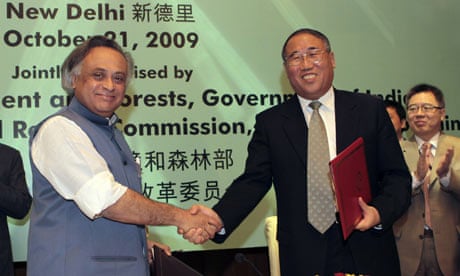China and India have signed a pact to coordinate their approach to climate negotiations and some domestic policies.
The world's two most populous nations signed a memorandum of understanding yesterday ahead of back-to-back summits between their leaders and US president Barack Obama next month.
The two nations will also form a joint working group that will meet once a year to coordinate policies. And they will cooperate on renewable energy and research into the effects of climate change on Himalayan glaciers.
But the timing of the announcement highlights the importance of maintaining at least a show of unity on the climate issue, despite heightened tensions between the two nations. China and India are among the leaders of the G77 bloc of developing nations, who have consistently argued that they should not be obliged to set internationally binding targets for reducing greenhouse gases because richer nations have a far greater historical responsibility for the carbon dioxide in the atmosphere.
But with China now the world's biggest emitter and India the fourth, one of the central goals of the Copenhagen summit is to find a formula that encourages these nations to make verifiable commitments to tackle climate change while leaving room for their economies to develop. The United States hopes to make progress towards a breakthrough when Obama meets China's president Hu Jintao in Beijing on November 16-17 and then plays host to India's prime minister Manmohan Singh at the White House on November 24.
But many inside these Asian nations are wary of efforts to make emerging economies break ranks. Earlier this week, the Indian Environment Minister Jairam Ramesh was castigated by the local media and opposition parties for supposedly considering a softening of India's negotiating position.
Ramesh has since clarified there is no change in Indian policy or its alliance with other developing nations. At the signing ceremony for the memorandum yesterday, he stressed: "There is no difference between the Indian and Chinese negotiating positions and we are discussing further what the two countries should be doing for a successful outcome at Copenhagen."
New Delhi has also sought reassurance from Beijing that China will not sign a bilateral deal with the US that runs contrary to G77 goals. At the signing ceremony, Xie Zhenhua, China's vice-chairman of National Development and Reform Commission and the country's top climate change negotiator, tried to soothe such concerns: "We regard India as a sincere, devoted friend and the MoU [memorandum of understanding] on climate change will take our cooperation on the issue to a new high."
Indian and Chinese climate campaigners welcomed the show of solidarity. "This is a good sign that developing nations are sticking together despite pressure from developed nations," said Siddharth Pathak, climate and energy campaigner of Greenpeace India. "They will not allow themselves to bullied by other countries."
Shirish Sinha, the head of the climate change programme at WWF India said the two nations faced common challenges in ensuring energy security and reducing poverty that set them apart from wealthier economies.
"It is largely in the interests of both countries given the pressure coming on them to take action, to really come together," he said. Despite the apparent hardening of positions and the lack of time before Copenhagen, climate negotiators said they had not given up hope of a positive outcome."
"I think the Copenhagen talks will eventually come up with something. So many people have been working on it for such a long time, and the whole world is watching, there will be something," said Liu Bin a climate expert at Tsinghua University and Chinese negotiator.
"I am getting a little more hopeful," said Chung Rae-Kwon, the climate change ambassador for South Korea. "I think we are getting progress in finding an agreement."
South Korea has proposed a compromise under which developing nations would register domestic actions to slow the growth of emissions. Although these targets would not be internationally binding, they would be subject to outside verification.
It is unclear, however, whether a suitable formula can be found in time to persuade India, China and the United States to sign up at Copenhagen. Preparatory talks last month in Bangkok ended in acrimonious squabbles.
"Time is running out," said Yang Fuqiang, the director of the climate change and energy programme of WWF China. "It's possible that all we will get at Copenhagen is a political declaration and an agreement to extend the process."
A key to any agreement is for the US Senate to ratify a climate bill before the country's negotiators go to Copenhagen. Former vice-president Al Gore, who is spearheading efforts to get a bill passed, told an audience in Beijing yesterday that he was confident of success, but he cautioned against over-expectation.
He said any global pact reached in Copenhagen was bound to disappoint many people, but it would be a step forward that could be strengthened at a later date once the business community received a signal that they would have to change their ways. "I choose to be optimistic," he said.



Comments (…)
Sign in or create your Guardian account to join the discussion